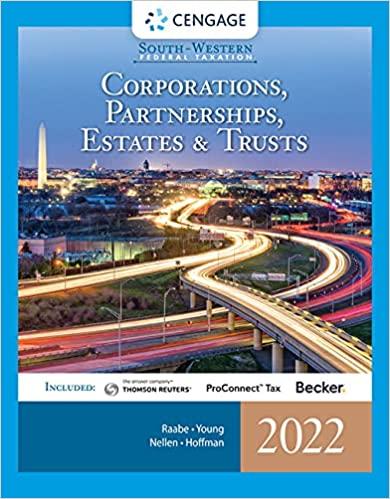Texas Land, Inc., wanted to acquire and develop 100 acres of property in west Texas at a
Question:
Texas Land, Inc., wanted to acquire and develop 100 acres of property in west Texas at a cost of $10,000,000 ($4,000,000 to purchase the land from ABC, Inc., and $6,000,000 for development costs). However, Texas Land had only $2,000,000 of cash available for the land purchase and no funds to put toward the development costs. Texas Land approached Gateway Savings & Loan, an S&L with significant tax losses but available cash. Gateway agreed to contribute the remaining $2,000,000 (for the land purchase) to a partnership (TG Partners) that would acquire and develop the property.
Gateway would also make additional funds available for the development as needed. (Gateway’s additional contributions would never total the remaining $6,000,000 cost because portions of the property were intended to be sold as they were completed, and those sales proceeds would fund future phases of the improvements.)
In return, Gateway will receive a guaranteed payment of 6% of its capital each year, plus Gateway and Texas Land will share (50%/50%) any profits on the development and sale of the property. The parties also agreed that Texas Land would manage the property and oversee its development and would receive a fixed guaranteed payment related to those services. No partnership agreement was drafted or signed.
As it turned out, Texas Land located another party (DEF, Inc.) that wanted to purchase “the best” 30 acres of the property for $5,000,000. Texas Land and Gateway arranged that the closing on the 100-acre purchase from ABC would occur the same day as the closing on the 30-acre sale to DEF. The $5,000,000 sales proceeds were enough to pay the entire purchase price to ABC, with $1,000,000 left over to begin improvements on the remaining 70-acre parcel. That first $4,000,000 of sales proceeds essentially funded the $2,000,000 capital contributions for both Texas Land and Gateway, so neither partner needed to immediately contribute cash to TG Partners.
Even though neither Texas Land nor Gateway invested cash upon formation, they intend to carry on as if TG Partners was established and is the entity completing the development activities. However, they are concerned that the IRS might contend that no partnership was formed and that the arrangement was simply designed to shift a tax liability (gain on the development) from Texas Land to Gateway, which has no current tax liability.
a. All of these events happened in the prior year, and now it’s February and TG Partners is your client. Review the rules of § 761. Under these rules, make your best case that TG Partners is, indeed, a partnership. (TG will operate on the calendar year.)
b. Consider the effect of the Check-the-box Regulations under Reg. § 301.7701 and your knowledge, in general, of partnership taxation. What can you do to ensure that partnership treatment is assured?
Step by Step Answer:

South-Western Federal Taxation 2022 Corporations, Partnerships, Estates And Trusts
ISBN: 9780357519240
45th Edition
Authors: William A. Raabe, James C. Young, Annette Nellen, William H. Hoffman





